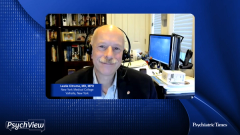
Pharmacological Treatment Options for Insomnia
Drs Paul Doghramji and Leslie Citrome review prescription drugs and over-the-counter remedies for treating insomnia.
Episodes in this series

Paul Doghramji, MD, FAAFP: Let’s go on to pharmacological therapy. When a patient comes in with insomnia and we decide—hopefully with some shared decision-making—that a medication is a wise idea, what considerations are there in choosing a medication?
Leslie Citrome, MD, MPH: For 1 thing, I’d want to ask my patient exactly what they’ve tried to help themselves sleep better because more often than not, they’ve already tried. Before seeing you, they’ve already gone to the drugstore and bought something over the counter. Whether it was successful or not, we need to find out. I wouldn’t be surprised at all if someone had already gotten diphenhydramine over the counter or tried other supplements with a combination of ingredients. I need to get that history. I also need to find out if they’ve received any prescription medicines in the past. Basically, they fall into 2 categories: those that are FDA approved for insomnia and those that are not and are used off-label. I want a complete history of what they’ve already gone through.
Paul Doghramji, MD, FAAFP: Do you have a particular opinion that you give to your patients about some of these over-the-counter remedies? There are so many of them. If you research on the internet, as far as insomnia goes, you’re going to see all these things, including herbal supplements and maybe nonprescription medications that you can get over the counter. Do you have an opinion that you share with your patients? What can we tell our patients about that?
Leslie Citrome, MD, MPH: I tell my patients that a lot of over-the-counter remedies have been tested and found to be ineffective or are potentially dangerous. The most common 1, diphenhydramine, can cause next-day drowsiness. That’s particularly a problem. Insomnia disorder is associated with daytime tiredness because you’re not sleeping well. If you’re going to use a medication approach that makes you fall asleep but still leaves you tired the next day, that’s not going to get at the next-day functioning that has to be improved. I emphasize the need to be alert the next day and that we can’t use anything with carryover effects. Many of the over-the-counter remedies have that or are simply ineffective.
Next, I have a discussion about what the FDA has approved in terms of insomnia disorder. In the old days we had benzodiazepines, which were used a lot, and then the Z-drugs, which are the nonbenzodiazepine receptor agonists that help people sleep. They replaced the benzodiazepines for many people, but they come with some baggage. The baggage with both benzodiazepines and the Z-drugs is the development of tolerance. When patients try to stop taking these medicines, they experience rebound insomnia—much worse than when it started. These are problematic. I also describe how melatonin receptor agonists have also been developed. There’s 1 in the marketplace, however, it takes a bit of time before it starts to work and is not for everyone. I mention low-dose doxepin because it’s out there, but that’s basically a repurposing of a tricyclic antidepressant at a lower dose and leveraging its adverse effect profile to help someone sleep. Lastly, I talk about the latest medicines available, the orexin receptor antagonists, as offering probably a superior approach to the treatment of insomnia disorder.
Transcript edited for clarity
Newsletter
Receive trusted psychiatric news, expert analysis, and clinical insights — subscribe today to support your practice and your patients.










